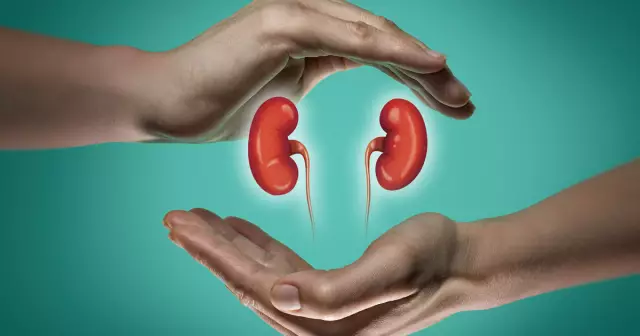- Author Rachel Wainwright [email protected].
- Public 2023-12-15 07:39.
- Last modified 2025-11-02 20:14.
Dystopia
The content of the article:
- Causes
- Kinds
- Signs
- Diagnostics
- Treatment
- Prevention
- Potential consequences and complications
Dystopia (allotopy, atopy) is a condition in which individual cells, tissue or organ are not located in a typical place.
Causes
In most cases, the onset of dystopia is associated with violations of embryonic development (dysembryogenesis), but sometimes traumatic effects, including surgical intervention, can lead to the movement of cells, tissue or organ.
Kinds
Examples of cellular dystopia are:
- the location of individual Purkinje cells in the granular layer, and not in the cerebellar cortex;
- the location in the nerve fibers of the lateral columns or spinal roots of individual nerve cells;
- endometriosis - the movement of endometrial cells to other organs (ovaries, intestines, navel, eyes).
A variant of tissue dystopia is the location of cartilage tissue from the second branchial arch in the mucous membrane of the esophagus or stomach, the lymphoid tissue of the tonsils.
Among the organs of dystopia, the testicles and kidneys are most often affected. Dystopia of the tooth is somewhat less common in clinical practice.
Kidney dystopia, in turn, is subdivided into unilateral and bilateral. It can be congenital and acquired (nephroptosis).
Depending on the location of the displaced kidney, the thoracic (subphrenic), iliac, pelvic and lumbar forms of dystopia are distinguished.
Signs
The signs of dystopia are determined by its type, the location of the displaced organ or tissue.
With dystopia, the tooth shifts in the dentition towards the oral cavity or vestibule, turns around its axis, is located above or below the line of the dentition. In some cases, a dystopic tooth is located in the wall of the nasal cavity, orbit, hard palate.

Source: 32top.ru
Dystopia of the kidneys in many cases is asymptomatic. In some patients, the pathology is manifested by pain sensations that are localized at the location of the displaced kidney.

Source: uromedik.ru
Dystopia of endometrial cells, that is, endometriosis, is manifested by the following syndromes:
- pelvic pain;
- dysmenorrhea (painful menstruation);
- dyspareunia (painful intercourse);
- pain when urinating and defecating;
- menorrhagia (prolonged and heavy menstrual bleeding);
- posthemorrhagic anemia;
- infertility.
Dystopia of the cerebellar tonsils (Arnold-Chiari I type syndrome) is their displacement through the foramen magnum into the spinal canal. In most cases, this developmental anomaly is asymptomatic and is discovered by chance during the examination of a patient associated with some other reason, that is, it is a diagnostic finding.

Source: Cerebellar tonsil dystopia
Diagnostics
If a kidney dystopia is suspected, the patient is referred for an abdominal ultrasound scan, excretory urography, radioisotope renography, magnetic resonance imaging or multispiral computed tomography of the chest and abdominal organs.
Tooth dystopia is detected by the dentist during the dental examination of the patient. In order to clarify the features of the displacement of a dystopic tooth, an assessment of the bite, teleradiography with the calculation of a teleroentgenogram is performed, and a plaster model of the jaws is made.
Treatment
Treatment of kidney dystopia is aimed at stopping the inflammatory process, removing calculi and preventing their formation. Patients with periodic courses are prescribed antibiotics, nitrofurans, sulfonamides, as well as drugs that improve blood flow in the kidneys. If stones form, they may need to be surgically removed. If the abnormally located kidney dies, then a nephrectomy is performed.
The choice of treatment method for tooth dystopia is determined by the degree of its displacement. In cases where a pathological tooth does not create serious functional or aesthetic problems for the patient, its sharp tubercles are ground. This prevents further injury to the oral mucosa. Orthodontic treatment is carried out if there is a place in the dental arch for a dystopic tooth. In other cases, the pathological tooth, as a rule, must be removed.
Prevention
There are no specific measures for the prevention of dystopia.
Potential consequences and complications
Possible complications of dental dystopia can be:
- malocclusion;
- trauma to the soft tissues of the oral cavity with the formation of decubital ulcers;
- pericoronitis.
The kidneys with dystopia are prone to the development of many pathologies:
- pyelonephritis;
- tuberculosis;
- nephrolithiasis;
- hydronephrosis.
YouTube video related to the article:

Elena Minkina Doctor anesthesiologist-resuscitator About the author
Education: graduated from the Tashkent State Medical Institute, specializing in general medicine in 1991. Repeatedly passed refresher courses.
Work experience: anesthesiologist-resuscitator of the city maternity complex, resuscitator of the hemodialysis department.
The information is generalized and provided for informational purposes only. At the first sign of illness, see your doctor. Self-medication is hazardous to health!






